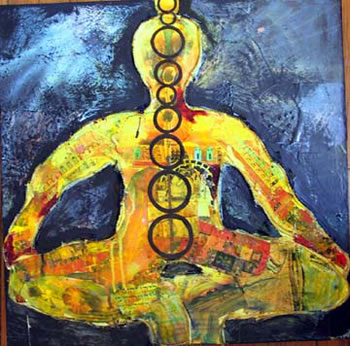I’ve been reading Eat, Pray, Love by Elizabeth Gilbert. It’s taken me a long time to get this far, but I made leaps and bounds over Thanksgiving weekend. I finished the entire middle section, the “pray” part, and it made such a profound impact on me that I need to reflect. Here are a few quotes that I found significant:
=====================================
There’s a difference between meditation and prayer, though both practices seek communion with the divine. I’ve hear it said that prayer is the act of talking to God, while meditation is the act of listening.
The premise of the middle section is that Elizabeth spends four months in an Ashram in India. (An Ashram is a place where people go to practice yoga, like a retreat center.) Part of the practice is daily meditation, and Elizabeth has trouble at first. I don’t know very much about yoga, I would like to learn more as my life goes on. But I have always felt that it fits very well with Christianity. I think it would be a great tool for any spiritual path, but because I happen to believe that Christianity is the true spiritual path, that particular relationship is my experience with yoga. I have heard that praying is talking to God, and reading Scripture is listening. However, it makes sense to me that while reading Scripture is very important to finding out God’s message to you, the time after reading, the time of silence, is equally as important. Just letting it sit in the mind, on the heart, letting it seep into the soul.
=======================================
“I can’t get my mind to sit still”
“If you sit down with the intention to meditate, whatever happens next is none of your business.”
“All I seem to do is argue with myself when I try to meditate.”
“That’s just your ego, trying to make sure it stays in charge. This is what your ego does. It keeps you feeling separate, keeps you with a sense of duality, tries to convince you that you’re flawed and broken and alone instead of whole.”
This was Elizabeth asking a mentor, Richard, for advice about her meditation struggles. Richard’s first comment is the heart and soul of meditation. You are not supposed to reject thoughts or try to restrain your mind. You are supposed to sit and observe thoughts, let them come and let them pass by.
The second comment Richard makes is profoundly important to me. It strikes me that he uses flawed, broken, and alone all together in one meaning, and whole as the opposite. If you read the entire section, you would know that the point is looking for God. The point is inviting God within, and recognizing God in all and all in God. (Sounds very Catholic, doesn’t it? I told you, yoga and Christianity!) We are not alone because we are not with people, and we are not made whole by other people. We are only alone when we do not seek God. And we are only whole when we allow God to live within us. Elizabeth brought this to a point in the following chapter:
As long as we live, every time we breathe in or out, we are repeating this mantra. I am That. I am divine, I am with God, I am an expression of God, I am not separate, I am not alone, I am not this limited illusion of an individual.
======================================
The Gurugita isn’t supposed to be a fun song to sing. It has a different function. It’s a text of unimaginable power. It is a mighty purifying practice. It burns away all your junk, all your negative emotions. And I think it’s probably having a positive effect on you if you’re experiencing such strong emotions and physical reactions while you’re chanting it. This stuff is painful, but it’s awfully beneficial.
This “Gurugita” that is spoken of is a 182-verse song that they chant each morning. It takes about 90 minutes, according to Elizabeth’s comments. She has huge issues with this daily ritual. They do this in the cold, with most people wearing hats and blankets and shivering through it, but Elizabeth gets so angry and agitated while chanting that she is hot and sweaty by the end of it. It doesn’t sound pleasant, but it reminds me of anything in life that is both important and tedious. I can’t stand tediousness. (Am I making up words again?) I dread and despise tedious tasks, whether ritual or simply routine, the same way Elizabeth dreads and despises the Gurugita. But tedious things are important for our souls. What is tedious and uncomfortable is purifying.


Dec 02, 2008 @ 10:36:33
I looove that book!
Dec 02, 2008 @ 11:32:58
I am still eating with Elizabeth. I have a long way to go.
Doris